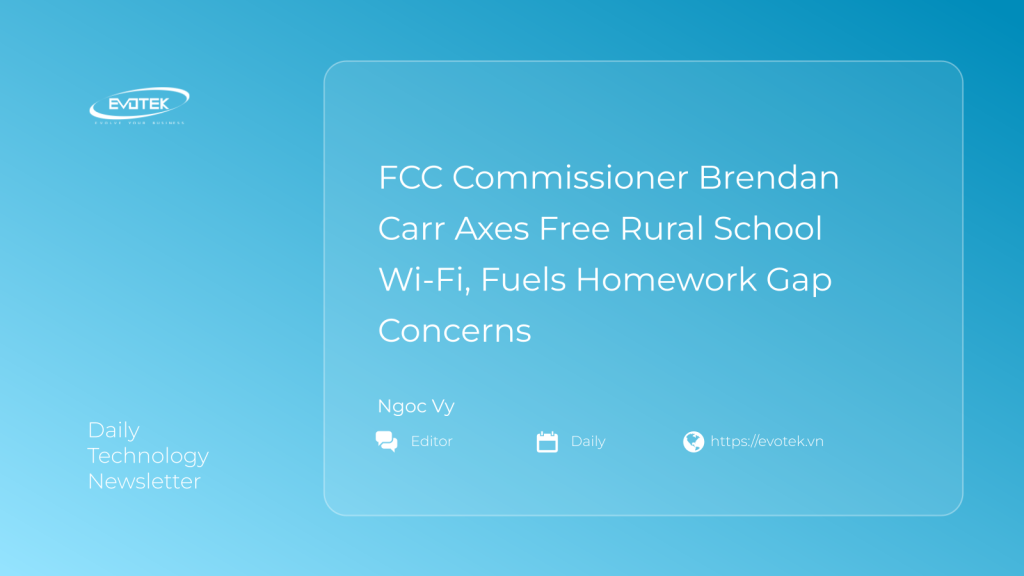FCC Commissioner Brendan Carr is once again at the center of controversy, this time for dismantling a popular program that provided vital free Wi-Fi access to disadvantaged rural schoolchildren. This move follows his recent highly publicized, and ultimately failed, attempts to ban a comedian and stifle free speech, which are currently under multiple investigations.
Despite the attention on his free speech controversies, Carr’s broader impact on crucial public services demands scrutiny. Just last week, he announced the termination of a broadly supported, bipartisan initiative designed to bridge the “homework gap” for students lacking reliable internet at home.
The Impact of Scrapping the E-Rate Program
The program, established by the Biden FCC, innovatively allowed schools to utilize existing E-Rate program funds to offer mobile Wi-Fi hotspots on school buses and in libraries. This enabled students in low-income households or areas without affordable broadband to get online for their studies. Crucially, this expansion of access came at no extra cost to taxpayers, as it reallocated existing FCC E-Rate budget without increasing it.
This “no-brainer” initiative was lauded for its bipartisan appeal, providing essential internet access to some of the nation’s most vulnerable youth. Yet, this widely supported effort faced fierce opposition from Senator Ted Cruz and Brendan Carr.
Corporate Interests Over Student Needs
The drive to eliminate this program is closely tied to the powerful interests of major telecommunications companies, such as AT&T. These corporate giants reportedly view government-facilitated free broadband as a threat to their revenue, fearing it could reduce demand for their often overpriced cellular services. Furthermore, such initiatives could jeopardize established practices within school subsidy programs that have historically benefited these large providers.
Unable to openly cite corporate protection as their motive, Carr and Cruz resorted to misleading justifications. They falsely claimed the program was illegal, asserted it would save taxpayer money (despite no budget increase), and even ludicrously suggested it “censored Conservative viewpoints”—a claim previously debunked.
Growing Opposition and the Homework Gap
Carr’s decision has triggered significant pushback. Senators, including Ed Markey, have voiced their concerns, while advocacy groups like the American Library Association (ALA) and the Schools, Health & Libraries Broadband Coalition (SHLB) have condemned the policy. These organizations emphasize that rolling back E-Rate hotspot provisions directly undermines efforts to address home connectivity inequities and exacerbates the “Homework Gap.” For millions of students, regardless of political affiliation, consistent internet access outside school is not a luxury but a fundamental requirement for academic success.
“Rolling back the E-Rate hotspot and school bus decisions would undercut some of the most effective tools for addressing inequities in home connectivity and would reverse progress in closing the ‘Homework Gap.’ For millions of students, especially those from low-income households, internet access outside of school walls is not a luxury but a prerequisite for academic success.”
A Pattern of Dismantling Consumer Protections
Carr’s actions appear to be part of a larger pattern. Critics argue he is systematically dismantling every aspect of the FCC that doesn’t directly serve the quarterly revenue targets of telecom giants like AT&T, Comcast, and Verizon—companies that are likely future employers. His tenure has seen significant cuts to broadband consumer protection, robocall enforcement, and efforts to limit media consolidation. He is also accused of derailing cybersecurity initiatives and basic FCC endeavors to combat long-standing racism in broadband deployment, effectively gutting efforts to police fraud by corporate behemoths.
This approach, often masked as “de-regulatory efficiency,” is viewed by many as a dangerous blend of corruption, regulatory capture, and radical right-wing extremism. While the press may largely overlook the impact of this particular program rollback, its consequences will be felt for decades. It is crucial to recognize that Carr’s controversial actions extend far beyond free speech debates, profoundly affecting consumer protection, public safety, and affordable connectivity for all Americans, especially the most vulnerable.

 日本語
日本語 한국어
한국어 Tiếng Việt
Tiếng Việt 简体中文
简体中文